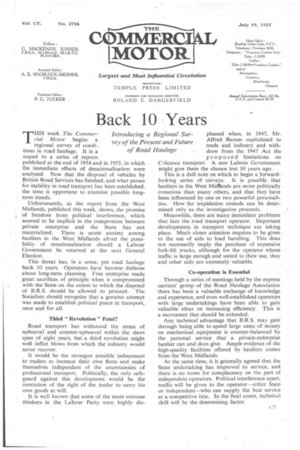Back 10 Years
Page 27

If you've noticed an error in this article please click here to report it so we can fix it.
THIS week The Commercial Motor begins a regional survey of conditions in road haulage. It is a sequel to a series of reports published at the end of 1954 and in 1955, in which the immediate effects of denationalization were analysed. Now that the disposal of vehicles by British Road Services has finished, and what passes for ,Stability in road transport has been established, the time is opportune to examine possible longterm trends.
Unfortunately, as the report from the West Midlands, published this week, shows, the promise of freedom from political interference, which seemed to be imPlicit in the compromise between private enterprise and the State has not materialized. There is acute anxiety among hauliers in the West Midlands about the possibility of renationalization should a Labour Government be returned at the next General Election.
This threat has, in a sense, put road haulage back 10 years. Operators have become dubious about long-term planning. Free enterprise made great sacrifices of principle when it compromised with the State on the extent to which the disposal of B.R.S. should be allowed to proceed. The Socialists should recognize that a genuine attempt was made to establish political peace in transport, once and for all.
Third " Revolution" Fatal?
Road transport has withstood the stress of upheaval and counter-upheaval within the short span of eight years, but a third revolution might well inflict blows from which the industry would never recover.
It would be the strongest possible inducement to traders to increase their own fleets and make themselves independent of the uncertainties of professional transport. Politically, the only safeguard against this development would be the restriction of the right of the trader to carry his own goods at will.
It is well known that some of the more extreme thinkers in the Labour Party were highly dis pleased when, in 1947, Mr. Alfred Barnes capitulated to trade and industry and withdrew from the 1947 Act the pro posed limitations on C-licence transport. A new Labour Government might give them the chance lost 10 years ago.
This is a dull note on which to begin a forwardlooking series of surveys. It is possible that hauliers in the West Midthands are more politically conscious than many others, and that they have been influenced by one or two powerful personalities. How far trepidation extends can be determined only as the investigation proceeds.
Meanwhile, there are many immediate problems that face the road transport operator. Important developments in transport technique are taking place. Much closer attention requires to be given . to the use of aids to load handling. This does not necessarily imply the purchase of expensive fork-lift trucks, although for the operator whose traffic is large enough and suited to their use, they and other aids are extremely valuable.
Co-operation is Essential • Through a series of meetings held by the express carriers' group of the Road Haulage Association there has been a valuable exchange of knowledge and experience, and even well-established operators with large undertakings have been ableto gain valuable ideas on increasing efficiency. This is a movement that should be extended.
Any technical advantage, that B.R.S. may gain through being able to spend large sums of money on mechanical equipment is counter-balanced by the personal service that a private-enterprise haulier can and does give. Ample evidence of the high-quality facilities offered by hauliers comes from the West Midlands.
At the same time it is generally agreed that the State undertaking has improved its service, and there is no room for complacency on the part of independent operators. Political interference apart, traffic will be given to the operator—either State or independent—who can snpply the best service at a competitive rate. In the final count, technical skill will be the determining factor.




























































































